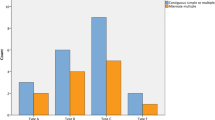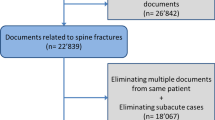Abstract
Purpose
The purpose of this study was to investigate the age- and gender-specific clinical characteristics of adult spine fractures in China.
Method
A retrospective investigation was performed on consecutive patients with acute spinal fractures in 83 hospitals of 31 provinces in China between January 2010 and December 2011. All adult patients (≥16 years) with spinal column fracture were included, while pathologic, old, and periprosthetic fractures were excluded. Each patient was analysed by reviewing the medical records and initial radiographs.
Results
There were 54,533 adult patients with spinal column fractures, accounting for 14.57 % of overall fractures. The medium age was 57 years (range 16–100 years). There were 27,466 male patients with medium age of 49 years and 27,067 females with medium age of 63 years. The male to female ratio was 1.01:1 in study. It was 1.74:1 in patients less than 59 years, and 0.51:1 above 60 years. The most common injury site was L1, which accounted for 33.83 % of cases. In the AO classification, the 53A and 52A groups comprised 85.53 % of all fractures.
Conclusions
This study demonstrates the age- and gender-specific clinical characteristics of adults spine fractures and reveals a significant relationship among ages, sex, fracture localisation and complexity of spine fractures. Using the age of patients, the likelihood of sustaining adult spine fractures is predictable.



Similar content being viewed by others
References
Samelson EJ, Hannan MT, Zhang Y, Genant HK, Felson DT, Kiel DP (2006) Incidence and risk factors for vertebral fracture in women and men: 25-year follow-up results from the population-based Framingham study. J Bone Miner Res 21:1207–1214
Hu R, Mustard CA, Burns C (1996) Epidemiology of incident spinal fracture in a complete population. Spine 21:492–499
Chen HY, Chiu WT, Chen SS, Lee LS, Hung CI, Hung CL, Wang YC, Hung CC, Lin LS, Shih YH (1997) A nationwide epidemiological study of spinal cord injuries in Taiwan from July 1992 to June 1996. Neurol Res 19:617–622
Van der Klift M, De Laet CE, McCloskey EV, Hofman A, Pols HA (2002) The incidence of vertebral fractures in men and women: the Rotterdam Study. J Bone Miner Res 17:1051–1056
Belmont PJ Jr, Taylor KF, Mason KT, Shawen SB, Polly DW Jr, Klemme WR (2001) Incidence, epidemiology, and occupational outcomes of thoracolumbar fractures among US Army aviators. J Trauma 50:855–861
Kanis JA, Johnell O, Oden A, Sembo I, Redlund-Johnell I, Dawson A, De Laet C, Jonsson B (2000) Long-term risk of osteoporotic fracture in Malmö. Osteoporos Int 11:669–674
Kannus P, Niemi S, Palvanen M, Parkkari J (2000) Continuously increasing number and incidence of fall-induced, fracture-associated, spinal cord injuries in elderly persons. Arch Intern Med 160:2145–2149
Jansson KA, Blomqvist P, Svedmark P, Granath F, Buskens E, Larsson M, Adami J (2010) Thoracolumbar vertebral fractures in Sweden: an analysis of 13,496 patients admitted to hospital. Eur J Epidemiol 25:431–437
Melton LJ 3rd, Lane AW, Cooper C, Eastell R, O’Fallon WM, Riggs BL (1993) Prevalence and incidence of vertebral deformities. Osteoporos Int 3:113–119
Davies KM, Stegman MR, Heaney RP, Recker RR (1996) Prevalence and severity of vertebral fracture: the Saunders County Bone Quality Study. Osteoporos Int 6:160–165
Pickelsimer E, Shiroma EJ, Wilson DA (2010) Statewide investigation of medically attended adverse health conditions of persons with spinal cord injury. J Spinal Cord Med 33:221–231
Baaj AA, Uribe JS, Nichols TA, Theodore N, Crawford NR, Sonntag VK, Vale FL (2010) Health care burden of cervical spine fractures in the United States: analysis of a nationwide database over a 10-year period. J Neurosurg Spine 13:61–66
Marsh JL, Slongo TF, Agel J, Broderick JS, Creevey W, DeCoster TA, Prokuski L, Sirkin MS, Ziran B, Henley B, Audigé L (2007) Fracture and dislocation classification compendium-2007: Orthopaedic Trauma Association classification, database and outcomes committee. J Orthop Trauma 21:S1–133
Zhang YZ (2012) Clinical epidemiology of orthopedic trauma, 1st edn. Thieme, Stuttgart, pp 293–326
Wang H, Zhang Y, Xiang Q, Wang X, Li C, Xiong H, Zhou Y (2012) Epidemiology of traumatic spinal fractures: experience from medical university–affiliated hospitals in Chongqing, China, 2001–2010: clinical article. J Neurosurg Spine 17:459–468
Leucht P, Fischer K, Muhr G, Mueller EJ, Leucht P, Fischer K, Muhr G et al (2009) Epidemiology of traumatic spine fractures. Injury 40:166–172
Cooper C, Atkinson EJ, O’Fallon WM, Melton LJ 3rd (1992) Incidence of clinically diagnosed vertebral fractures: a population-based study in Rochester, Minnesota, 1985–1989. J Bone Miner Res 7:221–227
Woo EK, Mansoubi H, Alyas F (2008) Incidental vertebral fractures on multidetector CT images of the chest: prevalence and recognition. Clin Radiol 63:160–164
Roux C, Fechtenbaum J, Kolta S, Briot K, Girard M (2007) Mild prevalent and incident vertebral fractures are risk factors for new fractures. Osteoporos Int 18:1617–1624
Fredø HL, Rizvi SA, Lied B, Rønning P, Helseth E (2012) The epidemiology of traumatic cervical spine fractures: a prospective population study from Norway. Scand J Trauma Resusc Emerg Med 20:85
Wang H, Xiang Q, Li C, Zhou Y (2013) Epidemiology of traumatic cervical spinal fractures and risk factors for traumatic cervical spinal cord injury in China. J Spinal Disord Tech 26:E306–313
Court-Brown CM, Caesar B (2006) Epidemiology of adult fractures: a review. Injury 37:691–697
Silva MJ (2007) Biomechanics of osteoporotic fractures. Injury 38:S69–76
Christiansen BA, Bouxsein ML (2010) Biomechanics of vertebral fractures and the vertebral fracture cascade. Curr Osteoporos Rep 8:198–204
Lang T, Streeper T, Cawthon P, Baldwin K, Taaffe DR, Harris TB (2010) Sarcopenia: etiology, clinical consequences, intervention, and assessment. Osteoporos Int 21:543–559
Looker AC, Melton LJ 3rd, Harris T, Borrud L, Shepherd J, McGowan J (2009) Age, gender, and race/ethnic differences in total body and subregional bone density. Osteoporos Int 20:1141–1149
Sigurdsson G, Aspelund T, Chang M, Jonsdottir B, Sigurdsson S, Eiriksdottir G, Gudmundsson A, Harris TB, Gudnason V, Lang TF (2006) Increasing sex difference in bone strength in old age: the age, gene/environment susceptibility-Reykjavik study (AGES-REYKJAVIK). Bone 39:644–651
Bagur A, Oliveri B, Mautalen C, Belotti M, Mastaglia S, Yankelevich D, Sayegh F, Royer M (2004) Low levels of endogenous estradiol protect bone mineral density in young postmenopausal women. Climacteric 7:181–188
Cummings SR, Browner WS, Bauer D, Stone K, Ensrud K, Jamal S, Ettinger B (1998) Endogenous hormones and the risk of hip and vertebral fractures among older women. Study of Osteoporotic Fractures Research Group. N Engl J Med 339:733–738
Ongphiphadhanakul B, Chanprasertyothin S, Chailurkit L, Chansirikarn S, Puavilai G, Rajatanavin R (2004) Differential associations of residual estradiol levels with bone mineral density and serum lipids in postmenopausal women with osteoporosis. Maturitas 48:193–196
Magerl F, Aebi M, Gertzbein SD, Harms J, Nazarian S (1994) A comprehensive classification of thoracic and lumbar injuries. Eur Spine J 3:184–201
Tosi LL, Boyan BD, Boskey AL (2005) Does sex matter in musculoskeletal health? The influence of sex and gender on musculoskeletal health. J Bone Joint Surg Am 87:1631–1647
Pickett W, Simpson K, Walker J, Brison RJ (2003) Traumatic spinal cord injury in Ontario, Canada. J Trauma 55:1070–1076
Frost M, Wraae K, Abrahamsen B, Høiberg M, Hagen C, Andersen M, Brixen K (2012) Osteoporosis and vertebral fractures in men aged 60–74 years. Age Ageing 41:171–177
Rao SS, Budhwar N, Ashfaque A (2010) Osteoporosis in men. Am Fam Physician 82:503–508
Clayton JL, Harris MB, Weintraub SL, Marr AB, Timmer J, Stuke LE, McSwain NE, Duchesne JC, Hunt JP (2012) Risk factors for cervical spine injury. Injury 43:431–435
Brown RL, Brunn MA, Garcia VF (2001) Cervical spine injuries in children: a review of 103 patients treated consecutively at a level 1 pediatric trauma center. J Pediatr Surg 36:1107–1114
Thompson WL, Stiell IG, Clement CM, Brison RJ, Canadian C-Spine Rule Study Group (2009) Association of injury mechanism with the risk of cervical spine fractures. CJEM 11:14–22
Author information
Authors and Affiliations
Corresponding author
Rights and permissions
About this article
Cite this article
Tian, Y., Zhu, Y., Yin, B. et al. Age- and gender-specific clinical characteristics of acute adult spine fractures in China. International Orthopaedics (SICOT) 40, 347–353 (2016). https://doi.org/10.1007/s00264-015-3025-y
Received:
Accepted:
Published:
Issue Date:
DOI: https://doi.org/10.1007/s00264-015-3025-y




